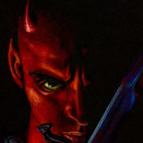[vc_row][vc_column][vc_column_text]
Demon – Creation itself constantly wandering parallel to humans and may also harm them. There are many similarities between the various demons and Dybbuk in the way they take over the body. But a demon, according to sources, can also take the form of an animal (goat or billy goat) or reside in homes and damage to the residents of the house. Protection against demons, look at the page of Demons detection and protection.
Dybbuk – the souls of the dead that did not find their place and they need guidance or correction. A more familiar phenomenon of obsession in Eastern Europe, and refers to the spirits of the wicked, take the body of the person to run away from their sins in previous lives, and try to communicate with the world through him. Even when possessed, as in the case of demons, impulsive and uncontrolled behavior is displayed. In most cases, possession enters women and not men
Asli – Moroccan nickname to a takeover of the evil spirit on the body of a man known in communities from Morocco, and treated him as ill demons. According to Moroccan Jewry, demons are creatures with supernatural powers; they can take the form and raid it. Demon can beat and hurt physically, or enter into the body. The Asli was attributed to women, that when suffered from it did not controlled by themselves, hitting themselves and others hard, words in strange languages spoken and their voices had changed to the sound of man or child. These phenomena previously referred to revolt in values which women were used to.
Zar – The zaar is a well known phenomenon for many years by the Ethiopian Jewry. Different sources compeer Ethiopian Queen of Sheba to Lilith. According to ancient Egyptian and Ethiopian culture, the zaar ghosts are in a parallel world to our world, they cause illnesses, extreme depression and inexplicable behavior. In contrast to the Dybbuk and Asli the solution is that a man prays and communicates with the evil spirit, or writes a special virtue for deportation, and chases her from the body. in the case of Zar problem treated by a former patient, who calls the spirit into the patient so he could talk and communicate with her – without an act of expulsion As Dibbuk and Wasli.
[/vc_column_text][/vc_column][/vc_row]



